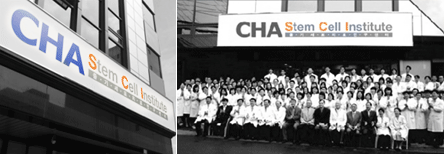CHA Stem cell institute, which launched a composite global institute to handle adult and embryonic stem cells, is a leader in treatment research for a range of acute and chronic illnesses, with four Korean institutes and excellent stem cell researchers from leading international universities.

It is a core technology development center for treatment of chronic diseases using stem cells.
The research team comprises 250 top researchers both within Korea and abroad, and is working on cell differentiation induction to treat specific diseases (blindness, Parkinson’s disease, cerebral palsy, stroke, degenerative arthritis, liver cirrhosis adult leukemia, diabetes, incontinence, cerebral apoplexy, and cerebral hemorrhage) and the establishment of a cell bank to extend life spans and treat chronic diseases.
Research area
- - Academic understanding and clinical application through the study of differentiation and regulation of embryonic / adult stem cells
- - Development of artificial tissues and organs via stem cells
- - Study of dedifferentiation to deal with specific stem cell reactions